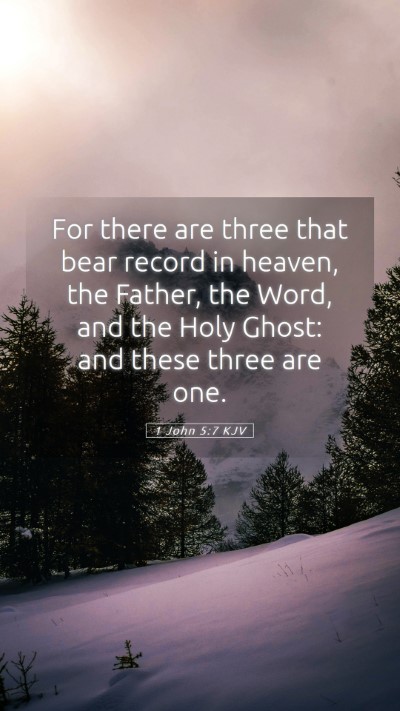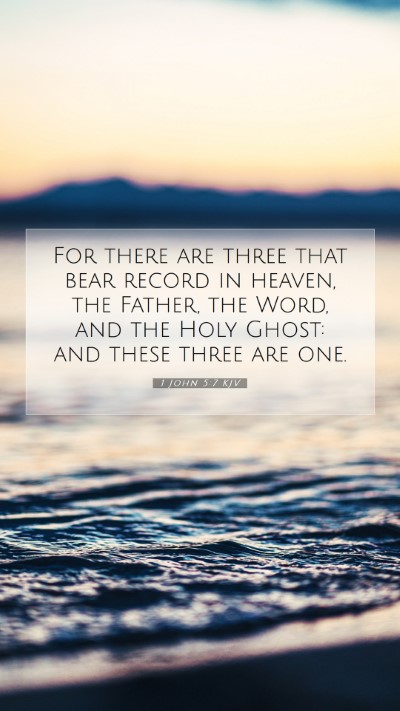Old Testament
Genesis Exodus Leviticus Numbers Deuteronomy Joshua Judges Ruth 1 Samuel 2 Samuel 1 Kings 2 Kings 1 Chronicles 2 Chronicles Ezra Nehemiah Esther Job Psalms Proverbs Ecclesiastes Song of Solomon Isaiah Jeremiah Lamentations Ezekiel Daniel Hosea Joel Amos Obadiah Jonah Micah Nahum Habakkuk Zephaniah Haggai Zechariah Malachi1 John 5:7 Meaning
What is the meaning of 1 John 5:7?
For there are three that bear record in heaven, the Father, the Word, and the Holy Ghost: and these three are one.
1 John 5:7 Bible Verse Meaning
1 John 5:7 - Bible Verse Explanation and Commentary
1 John 5:7 (KJV) states: “For there are three that bear record in heaven, the Father, the Word, and the Holy Ghost: and these three are one.” This verse is pivotal in understanding the doctrine of the Trinity within Christian theology, emphasizing the unity of God in three persons.
The complexities surrounding this verse have led to various interpretations and debates, especially regarding its authenticity and textual variants. Below, we delve into a summary of insights drawn from respected public domain commentaries by Matthew Henry, Albert Barnes, and Adam Clarke.
Meaning of 1 John 5:7
This verse articulates the essential Christian belief in the Trinity, illustrating how the Father, the Word (identified as Jesus Christ), and the Holy Spirit are distinct yet unified. The significance of their oneness is foundational to Christian doctrine, suggesting that these divine persons function in harmony and under a shared essence.
Commentary Insights
-
Matthew Henry's Commentary:
Henry emphasizes that the unity expressed in this verse reinforces the divine authority of the witnesses in heaven. He points out that the language indicates a partnership between the three divine entities, which highlights their collective testimony to Jesus Christ’s divinity and the salvation it brings. The witness of the Father, the Word, and the Holy Spirit serves as a powerful affirmation of a singular divine mission.
-
Albert Barnes' Notes:
Barnes provides a detailed examination of the textual history of this verse. He notes that some manuscripts omit parts of the text, causing debate about the original wording. Despite this, he maintains that the doctrinal truth remains consistent: believers must recognize the harmony and coequal nature of the Trinity. Barnes underlines its importance in establishing foundational doctrines such as the incarnation and salvation.
-
Adam Clarke's Commentary:
Clarke discusses the implications of the verse within the broader context of John’s epistles, asserting that it reinforces the apostolic authority of Jesus Christ and the necessary belief in His divine nature. He stresses the importance of the Holy Spirit's role in illuminating this truth and facilitating believers' understanding of God's unity.
Bible Verse Interpretations
The interpretations of 1 John 5:7 highlight several key components for biblical exegesis:
- Unity of God: The verse asserts that God is one, yet exists in three persons, each fulfilling a unique role in the salvation narrative.
- Testimony to Christ: The three witnesses validate the truth of Christ, emphasizing His role as both divine and the Savior of humanity.
- Doctrine of the Trinity: This verse serves as a cornerstone for understanding the triune nature of God—Father, Son, and Holy Spirit—central to Christian doctrine.
Application of 1 John 5:7
Understanding 1 John 5:7 aids in applying biblical truths to daily life:
- Believers are encouraged to develop a deeper relationship with each person of the Trinity—recognizing the Father’s love, Jesus’ sacrifice, and the Holy Spirit’s guidance.
- In community and personal Bible studies, this verse can be a focal point for exploring the nature of God and His actions in the world.
- Reflecting on this verse can bring reassurance of the unified support from the divine as believers navigate challenges and uncertainties.
Cross References
This verse connects well with several other scripture passages, which further illuminate its meaning:
- Matthew 28:19: "Go therefore and make disciples of all nations, baptizing them in the name of the Father and of the Son and of the Holy Spirit."
- John 10:30: "I and my Father are one."
- 2 Corinthians 13:14: "The grace of the Lord Jesus Christ, the love of God, and the fellowship of the Holy Spirit be with you all."
Conclusion
In conclusion, 1 John 5:7 encapsulates foundational truths about the Christian faith and invites believers to explore the complex yet harmonious relationship of the Trinity. The commentaries shed light on the doctrinal significance and encourage ongoing reflection and study. Whether in Bible study groups or individual devotion, understanding this verse enriches one’s comprehension of Scripture and the nature of God.
For anyone seeking deeper insights, engaging with this verse through study guides or courses can facilitate a richer understanding of its implications and applications in everyday life.


